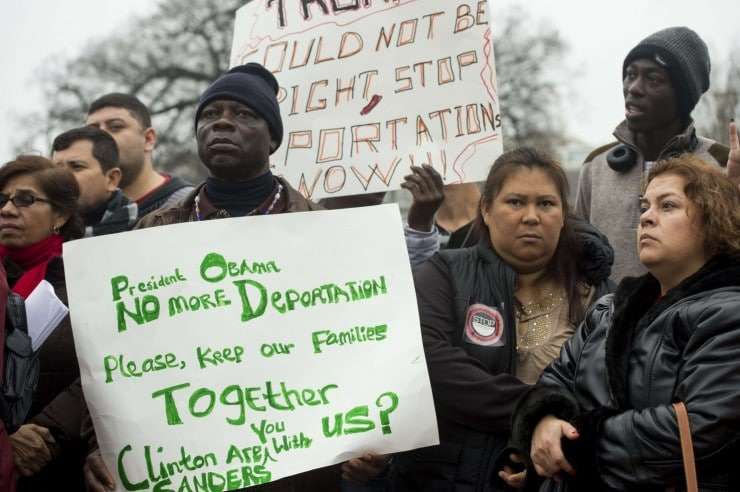The Volokh Conspiracy
Mostly law professors | Sometimes contrarian | Often libertarian | Always independent
Thoughts on the Supreme Court oral argument in US v. Texas

The Supreme Court held oral arguments today in United States v. Texas, a case involving a challenge to president Obama's order deferring deportation for some 4 million undocumented migrants. The transcript is available here.
The argument strongly suggests that the justices are split along ideological lines, with the four conservatives (or at least the three who asked questions; Justice Thomas almost never does so, and did not in this case) supporting the state governments challenging the policy, and the four liberals supporting the administration. This division along ideological lines is unfortunate. For reasons I outlined here and here, there are in fact good reasons for conservative originalists and supporters of unitary executive theory to uphold the policy. If the justices do end up splitting 4-4, the lower court decision against the policy will stand. But its ultimate fate will have to await the appointment of a new justice to the seat vacated by Justice Scalia's death. Alternatively, the president's order might be rescinded or modified by whoever wins the 2016 election.
Much of the discussion in the oral argument focused on the president's grant of "lawful presence" to the immigrants covered by the order. While this may seem like a big deal, in reality "lawful presence" does not actually legalize the presence of any otherwise illegal migrants, and does not prevent any from being deported at any time the president might choose. For the most part, it merely reiterates the executive's discretionary decision not to deport the migrants covered by the order. But it does also allow them to accrue time for the receipt of Social Security and Medicare benefits that, however, they are unlikely to ever actually receive unless their status is genuinely legalized at some point in the future, and they remain in the US until after retirement age. Moreover, the "lawful presence" element of the President's order can easily be struck down separately, without affecting the other, far more important aspects of the policy.
During the oral argument, Texas Solicitor General Scott Keller (arguing on behalf of the plaintiff states) made a notable admission:
Justice Kagan: "[T]ake out the work authorization, take out the Social Security, and take out that phrase [lawful presence]….[C]an the government say to all of these people, and say it all at once, not one by one, yes, ….all of you are low priority. We will not be coming after you, and we will not deport you unless we change our minds?
Keller: And, Justice Kagan, they can do that….. But what they can't say its deferred action that grants a status under the benefits regulation…
Later during the argument, Justice Kagan asked if the president could "say to these however many million people it is, you will not be deported unless we change our minds." Keller responded: "If that's all they are doing, yes."
Thus, Keller appears to have abandoned the central argument repeatedly made by the plaintiffs and emphasized in lower court rulings against Obama's order: the idea that it is illegal because it replaces "case by case" discretion on deportation with a categorical rule imposed by the president. This argument was reiterated in the plaintiffs' brief before the Supreme Court (e.g. - pp. 64-67). If Keller's admission is taken seriously, he has conceded that the heart of the administration's policy - systematic deferral of deportation - is therefore lawful. Only subsidiary elements (work authorization and grant of "lawful presence") remain at issue. Either or both could be invalidated without striking down the administration policy as a whole (though the work permits are explicitly authorized by statute and should be upheld on that basis).
If the justices recognize this point, it could potentially offer a way out of their current ideological deadlock: They could uphold the deferred deportation provision of the order as within the scope of executive discretion, endorse the work permits because Congress authorized them, but strike down the grant of "lawful presence."
It is also possible that the justices could dismiss the case because the states lack standing to challenge the president's policy, an issue much-discussed in the oral argument. However, I consider that unlikely, for reasons well articulated by Jonathan Adler. The states' standing argument is pretty strong, and is well supported by precedent. Still, the spectacle of conservatives arguing for broad standing rules in this case, and liberals arguing for narrow ones, is yet another sign of a trend I first noted back in 2010: the two sides of the political spectrum are changing where they stand on standing. Instead of liberals consistently supporting a broad approach to standing and conservatives consistently arguing for the opposite, both now usually take a largely strategic approach to the issue.
UPDATE: Noticably absent from the oral argument was any discussion of the plaintiffs' claim that the president's action violates the Take Care Clause of the Constitution. This argument has gotten a lot of attention in amicus briefs, and from legal scholars opposed to Obama's position. But if the oral argument is any indication, the justices don't seem to have much interest in it.
UPDATE #2: Elsewhere in the oral argument, SG Keller sought to diminish the force of his admission by distinguishing between "deferred action" and "forbearance from removal." But given that he concedes that the latter is permissible even if it is systematic, announced in advance, and affects millions of people, that terminological distinction changes nothing. Keller does at times suggest that the difference between the two may lie in the provision of "lawful presence" and eligibility for employment. But, as discussed above, these elements are separable from the core of the administration's policy, which focuses precisely on systematic "forbearance" from deportation.


Show Comments (0)